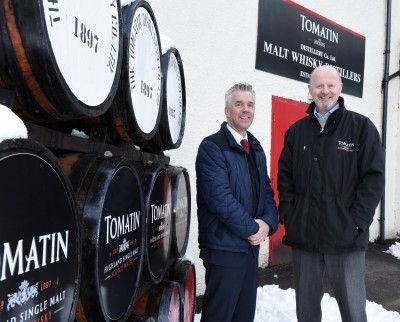

In a move to significantly reduce fuel costs and carbon emissions, the Tomatin whisky distillery in the Scottish Highlands has chosen Flogas Britain for a conversion from oil to LPG.
The distillery, which produces over two million litres of whisky a year, is based in an off-grid location in the Monadhliath mountains. It historically relied on Heavy Fuel Oil and coal to meet its substantial energy requirements, which made for very high fuel costs and a large carbon footprint.
With the need to reduce both, Tomatin initially introduced a biomass boiler – a fuel option previously unused in the Scottish distilling industry.
The biomass system alone was unable to supply enough energy for the entire energy-intensive distilling process, so Tomatin was still left with an inefficient, expensive and polluting ten MW oil boiler to fulfil the shortfall.
The off-grid business was keen to find an effective, efficient and economical solution – one that would break its dependence on oil. After consulting with others in the industry, including former colleagues at the Knockdu distillery, Tomatin turned to leading supplier Flogas to convert the oil boiler to LPG.
Graham Eunson, general manager at the Tomatin Distillery, said: “We needed a replacement for our oil boiler that would be cheaper to run, reduce our carbon footprint and be easier to maintain. The whisky industry is not keen on change, and we like to reduce risk as much as we can, so we spoke to colleagues in the industry who had already switched from oil to LPG. Flogas were highly recommended, so it was an easy decision for us to work with them.”
After a full assessment of Tomatin’s unique requirements, Flogas presented a completely managed LPG conversion process. Flogas managed the installation of 12 two-tonne tanks, along with the pipework and burner installations. The tanks were located behind the distillery buildings, out of site to the general public, and the whole LPG system was installed and up and running within a week, with minimum disruption to production.
Since installing the LPG system, Tomatin has seen financial savings of over 15% on its fuel bills. Original estimates predicted a return on investment of between 12 months and two years, but the system is now expected to pay for itself in just one year. Tomatin is also on track to reduce its annual carbon emissions by 560 tonnes.
Graham Eunson added: “Flogas managed the whole process from start to finish, and it was seamless. We’re seeing large savings and are already ahead of our return on investment schedule. In addition to the financial and carbon savings we’re making, maintenance has been substantially reduced. The oil boiler required daily attention, but beyond the statutory safety checks, the new LPG system has been maintenance free.
“We’ve also found LPG to be an easier fuel to use. Where oil had to be pre-heated before it could flow through the pipes, LPG doesn’t, allowing us to reduce energy consumption from the very start of the process. Combine this with the LPG burners running for shorter periods than their oil predecessors, due to them being more efficient, the advantages of LPG just keep mounting up.
“The conversion from oil to LPG has gone swimmingly well. The Flogas team were easy to work with and we’d have no problem recommending them to other distilleries.”
